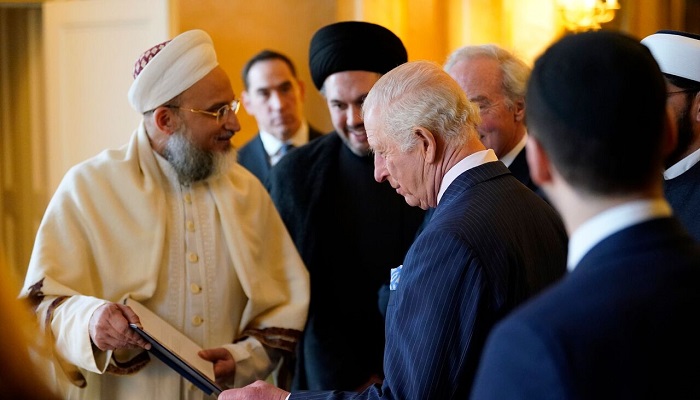PNN – Charles III, the King of England, in a situation where London is facing widespread criticism due to its clear support for the Zionist regime in the devastating war in Gaza, hosted a meeting between Jewish and Muslim religious leaders and announced the signing of a document entitled “Reconciliation Agreement”; An action that critics see as more like a political gesture and a propaganda effort to manage the crisis than a real initiative to resolve disputes.
According to the report of Pakistan News Network, in this meeting held at Buckingham Palace, the King of England referred to this agreement as a “wonderful step” to create mutual understanding between the Muslim and Jewish communities; but critics see it as merely a diplomatic show in a crisis situation.
According to official reports, the agreement, known as the “reconciliation agreement”, was initially agreed at Drumlanrig Palace in Scotland and then finally approved at Buckingham Palace. The Royal Palace claimed in a statement that the agreement was based on cooperation, peaceful coexistence and mutual respect, but did not provide specific details on its implementation mechanism.
The basic question that is raised in the meantime is whether this agreement is really a measure to reduce tensions or an attempt to manage international crises and control public opinion? Some political analysts believe that by entering this field, Buckingham Palace intends to strengthen its role in the public diplomacy scene, rather than seeking to resolve religious disputes.
Read more:
Political dimensions and diplomatic messages
The presence of British government officials and representatives from Scotland and the European Union in this meeting has fueled the suspicion that this event is not just a religious act and has wider political dimensions. Some observers see this agreement as part of the British government’s efforts to show its mediating role in global tensions and support Tel Aviv’s policies.
At the same time, this agreement has been announced while there are widespread criticisms of the British government’s performance in humanitarian crises, including the Gaza war, and the dual positions of the West regarding international developments. According to some critics, Buckingham Palace is trying to improve the country’s image with such initiatives in a situation where the government’s practical policies are still defined in line with the strategic interests of its allies.
One of the most important questions is the enforceability of this agreement and its real effect in solving the existing tensions. While the signatories emphasize the importance of this document, there is no guarantee that this agreement will make a difference in practice.
In addition, the absence of influential figures from Muslim countries has increased doubts about the effect of this agreement. Many believe that if this initiative was really an attempt to resolve the differences between these two religious communities, then representatives of the influential countries in the Middle East conflicts should also be present in it.
All in all, the Buckingham Palace meeting and the signing of the “reconciliation agreement” were nothing more than a publicity stunt from the point of view of many observers, and it cannot be considered an effective measure in the direction of conflict resolution. While British officials try to mention this agreement as a sign of their pacifist approach, the lack of specific implementation mechanisms, the lack of binding commitments and the absence of key players in this agreement have raised serious doubts about its legitimacy.
Therefore, it seems that Buckingham Palace is more than seeking to achieve real peace between religious communities; it is seeking to send diplomatic messages and maintain its position in the context of increasing global criticism of the West’s dual approaches to international developments.

